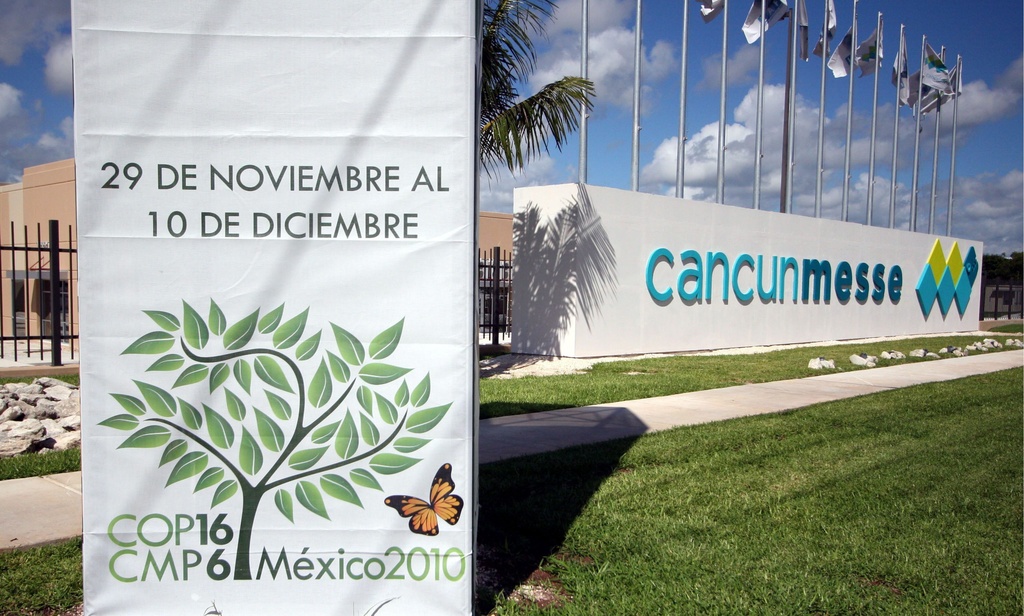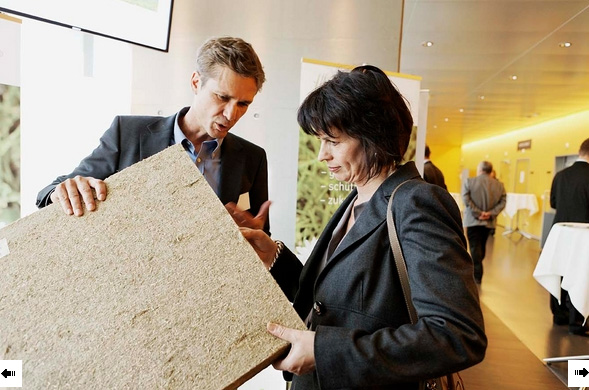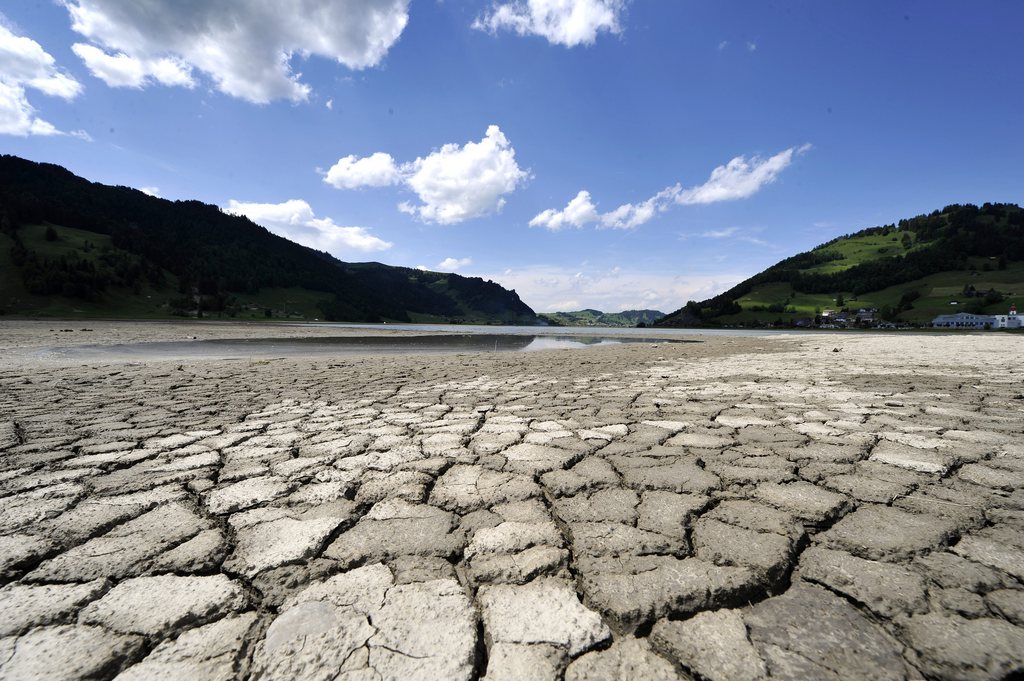Emission cuts are “crucial” to success in Cancun

The Swiss delegation has headed to the United Nations climate summit in Cancun intent on pushing ahead a global deal and securing binding emission cuts for all.
The conference’s success or failure depends on whether non-Kyoto Protocol countries show a willingness to submit to binding targets to cut emissions, says Swiss delegation head Franz Perrez.
The summit starting in the Mexican resort on Monday will focus on developing a package of measures on finance, deforestation, clean energy technologies and adaptation. This will lay the groundwork for a legal deal for next year’s climate conference in South Africa.
Although agreement on a global deal to reduce carbon emissions still looks remote, the UN expects to make big strides in Cancun in the creation of a fund to help poorer countries adapt to climate change, as well as a plan to counter deforestation and steps for improving access to clean energy technologies.
“The skeleton and the bones are there. In some parts we would like to add the meat,” Perrez told swissinfo.ch. “We would like to have a package in which we make substantial progress in each of the different negotiation tracks.”
Setting the basis for a legally binding framework for non-Kyoto Protocol nations would be “a huge additional step”, he said.
After the failure to produce a deal at the previous climate summit in Copenhagen, the top UN official for Cancun, Robert Orr, has taken expectations down a notch, stating outright that no one expects a final deal to be reached in Cancun. “Climate change wasn’t created overnight and won’t be solved overnight,” he said.
UN Secretary-General Ban Ki-moon will open the ministerial segment from December 7-10 and will urge countries to “work toward a balanced set of outcomes”.
Finding a balance
“It’s time to get down to business,” Patrick Hofstetter, spokesman for the Swiss Climate Alliance, a federation of 60 organisations from civil society, told swissinfo.ch.
“We need to work on all elements of the package to bring them to a higher level in order to be able to turn it into an agreement next year.”
For its part, Switzerland wants a balance between the commitments and concessions to be made by industrialised and newly industrialised nations. It backs setting a binding limit on rising temperatures of two degrees Celsius, as was agreed in Copenhagen.
It also plans to “considerably” increase its funding to help developing nations adapt to climate change and cut emissions, and will propose creating a working group of experts to look at the options for a $100 billion (SFr99.7 billion) fund for developing countries.
Crucial issue
Debate on the Kyoto Protocol will revolve around whether to go into a second commitment period once it expires at the end of 2012, and if so, how and with which countries. The process is at a standstill, with nations unable to agree on emission reductions.
Switzerland favours a follow-up commitment period for the Kyoto Protocol – but only if non-signatory countries undertake similar binding targets.
“Kyoto on its own doesn’t make sense. In that case, we would prefer not to do it. Why do that now if we know that as a global community we will fail to solve the problem,” Perrez explained.
“That’s the reason why this ‘if’ is one of the very crucial issues. I think this will be the element which will make Cancun a failure or a success.”
Switzerland has set a greenhouse gas emission reduction target of 20 per cent by 2020, compared with 1990 levels, or 30 per cent if other nations take on similar targets.
For the Swiss Climate Alliance, most of the work on the content of the new Kyoto commitment period needs to be done in Cancun.
“It is a prerequisite in order to make progress on other issues because many developing countries just do not believe that industrial countries are living up to their promises of the past or that they will make further steps” said Hofstetter.
Presidential boost
Swiss President Doris Leuthard, who also serves as environment minister, will be one of the few presidents attending and as such will have more time to address the event and explain Switzerland’s stance.
The Climate Alliance has drawn up a list of jobs for her in Cancun. As well as fixing the two degree temperature cap, Switzerland should also set higher emission reduction targets (40 per cent compared with 1990 levels), support creating new funds for climate and back new funding sources such as aviation taxes.
Lastly, as a member of the special negotiating body, the Environmental Integrity Group, the Alliance says Switzerland should work to prevent weak compromises during talks. The group has played such a role in the past but its influence will be less this time as one of the members, Mexico, has to remain neutral as the summit host.
“In Cancun, Mrs Leuthard can make an important contribution to a healthy global environment and create optimal conditions for a strong Swiss cleantech industry, with the corresponding jobs,” said the Alliance, referring also to Switzerland’s goal to become a leader in cleantech.
“Good luck,” the statement concluded.
A WWF Switzerland poll has found that 69% of the Swiss population want government policies to do more against global warming.
A majority of respondents said Switzerland should become the European country with the best climate protection. An important step in this regard is the people’s initiative for a healthy climate, will calls for 30% CO2 emission reductions in Switzerland by 2020. A vote on the issue should take place in 2012, but if it was held today 64% of people questioned would back it.
73% said politicians needed to be more active on the climate front.
18% of people said they were not worried about climate change.
74% said Switzerland should be implementing tougher environmental protection regulations today, regardless of whether a global climate deal is reached.
The UN Climate Change Conference takes place in Cancun, Mexico from November 29 to December 10.
The negotiating process revolves around sessions of the signatory parties to the UN Framework Convention on Climate Change (UNFCCC), which meet annually to review how the convention is being implemented.
Talks will include the issues of adaptation, reducing greenhouse gas emissions, climate finance, and the future of the Kyoto Protocol.
The UN and Mexico say progress has also been made on setting up funding for developing nations to cope with the effects of climate change, as well as the thorny issue of measuring and verifying countries’ emissions of greenhouse gases but that a deal to replace the Kyoto Protocol was farther off.
The protocol, the UN’s main tool for curbing greenhouse gas emissions, expires at the end of 2012.
More than 120 nations agreed in Copenhagen in 2009 to find a way to limit the rise in average global temperatures to less than 2 degrees Celsius but differences remain over how to achieve that goal.
Ahead of the summit China admitted producing the most greenhouse gases. But it says the main engine driver for talks is still the developed nations, the US in particular.

In compliance with the JTI standards
More: SWI swissinfo.ch certified by the Journalism Trust Initiative






You can find an overview of ongoing debates with our journalists here. Please join us!
If you want to start a conversation about a topic raised in this article or want to report factual errors, email us at english@swissinfo.ch.